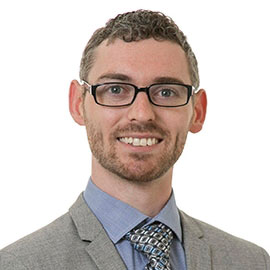Tyler Perini, a Ph.D. student studying operations research in Georgia Tech’s H. Milton Stewart School of Industrial and Systems Engineering (ISyE), has been given the 2020 Best Student Paper Award by the INFORMS Computing Society. His winning paper is “A Criterion Space Method for Biobjective Mixed Integer Programming: The Boxed Line Method," which appeared in the INFORMS Journal on Computing 32:1, 16-39 (2020).” Perini’s co-authors include ISyE faculty members Fouts Family Professor Natashia Boland and James C. Edenfield Chair and Professor Martin Savelsbergh, and Diego Pecin, assistant professor at the Erasmus School of Economics in Rotterdam, Holland.
In the following Q&A, Perini discusses his research, how his ISyE skills have developed throughout the course of his graduate studies, and what he plans to do after graduation.
Can you provide a high-level description of your research, and also share why you’re interested in these particular topics?
I work on multi-objective optimization algorithms, which extends classic optimization methods to problems with two or more competing objectives. I love this topic because I think that – slowly but surely – there will be a major paradigm shift in operations research where single objectives become mostly obsolete. Most problems in industry have naturally competing objectives, but they are often modeled by a substitute single objective, which easily misses valuable solutions.
You received an NSF Graduate Research Fellowship your first year as a Ph.D. student at ISyE. How have your research and ISyE skills progressed since receiving that award?
Due to the focus of my dissertation work, I have certainly improved in developing algorithms and testing algorithms. I have also refined soft skills as a researcher, including working with two international collaborations, one in Germany and another in Australia. This year, I have also created a Covid-19 dashboard for the public, which provides interactive tools to view risk around Georgia.
You once said that you considered becoming a high school math teacher. How and why did your love of math begin and evolve to where you are today?
I think part of loving math for me was that it usually came easily to me in middle school and high school. I knew that I was good at problem solving, and I enjoyed working with and tutoring others to teach them as well. During my undergraduate studies [at the College of Charleston], I realized I could use math to solve real-world problems, and I saw so much potential in operations research. Here at Georgia Tech, I’ve learned how to create advanced tools for solving large-scale problems. However, I have still yet to sink my teeth into many real-world problems; so that’s my goal for a postdoctoral research position.
What did it feel like to be notified that you won this year's ICS Student Paper Prize?
It was both so surprising and so satisfying. I’ve often felt that multi-objective optimization research gets siloed away into its own corner, so I didn’t really expect to be seriously considered. Even then, I wasn’t confident that what I thought was novel and important in this paper would really be award-worthy. Obviously, I am very pleased to be wrong about both.
Can you tell us – again, from a high-level – what your paper is about, and the conclusions you draw in it?
This is an algorithm paper that presented a new approach for a broad class of problems with the following features: (1) some continuous variables; (2) some discrete variables; (3) two objectives; and (4) everything is linear.
The algorithm follows simple intuition. It finds pieces of the Pareto frontier, usually somewhere in the middle, and in a reasonable chunk. Both of these features mean that we can provide a very diverse approximate of the Pareto frontier very quickly, and that we can actually bound the number of subproblems we solve by the total number of chunks in the frontier.
This latter complexity result was the first of such results for this class of algorithms, and I believe that’s an important reason why it won this award.
What are the next steps for your academic career?
I am in my last year of my doctoral program at Georgia Tech. I am searching for postdoc research opportunities, mostly abroad, and after that I will likely apply for a faculty position – somewhere in the world!
